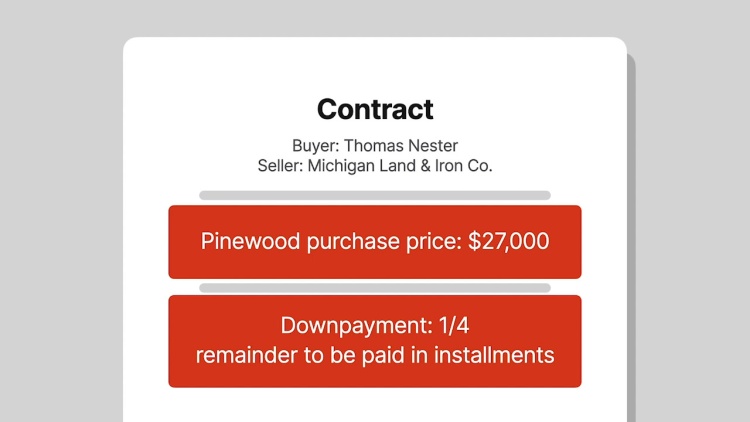Nester v. Michigan Land & Iron Co.
Michigan Supreme Court
37 N.W. 278 (1888)
- Written by Sarah Larkin, JD
Facts
Michigan Land & Iron Co. (Michigan) (defendant) agreed to sell Nester (plaintiff) all the lumber fit for saw logs on specific land that Michigan owned. Nester had been a lumberman for 25 years and was familiar with the area in which the Michigan land was located. Michigan provided Nester with a description of the lumber on the specified land, but did not warrant that the descriptions or estimates would be correct. These descriptions and estimates had been provided to Michigan by its agents for its own use. Nester had obtained his own estimates with regard to the lumber. Prior to entering into the contract, the parties spent about three months discussing the quality of the lumber and the amount the land was expected to yield. The agreement provided that Nester would pay for the lumber in installments and would not cut the lumber faster than it was paid for. Nester, without Michigan’s consent, cut all the lumber available on the specified land after making only one payment. Michigan brought suit for replevin, seeking return of the lumber. Nester filed this lawsuit to enjoin prosecution of Michigan’s suit or, in the alternative, to force Michigan to accept about one-half of the agreed-upon price. Nester’s alternative ground was due to its claim that the amount of lumber on the property was less than the parties had anticipated and of poorer quality than the parties had estimated when entering into the contract. The trial court found in Nester’s favor, holding that he only had to pay approximately half of the agreed-upon purchase price. Michigan appealed to the Supreme Court of Michigan.
Rule of Law
Issue
Holding and Reasoning (Sherwood, C.J.)
What to do next…
Here's why 911,000 law students have relied on our case briefs:
- Written by law professors and practitioners, not other law students. 47,100 briefs, keyed to 997 casebooks. Top-notch customer support.
- The right amount of information, includes the facts, issues, rule of law, holding and reasoning, and any concurrences and dissents.
- Access in your classes, works on your mobile and tablet. Massive library of related video lessons and high quality multiple-choice questions.
- Easy to use, uniform format for every case brief. Written in plain English, not in legalese. Our briefs summarize and simplify; they don’t just repeat the court’s language.





